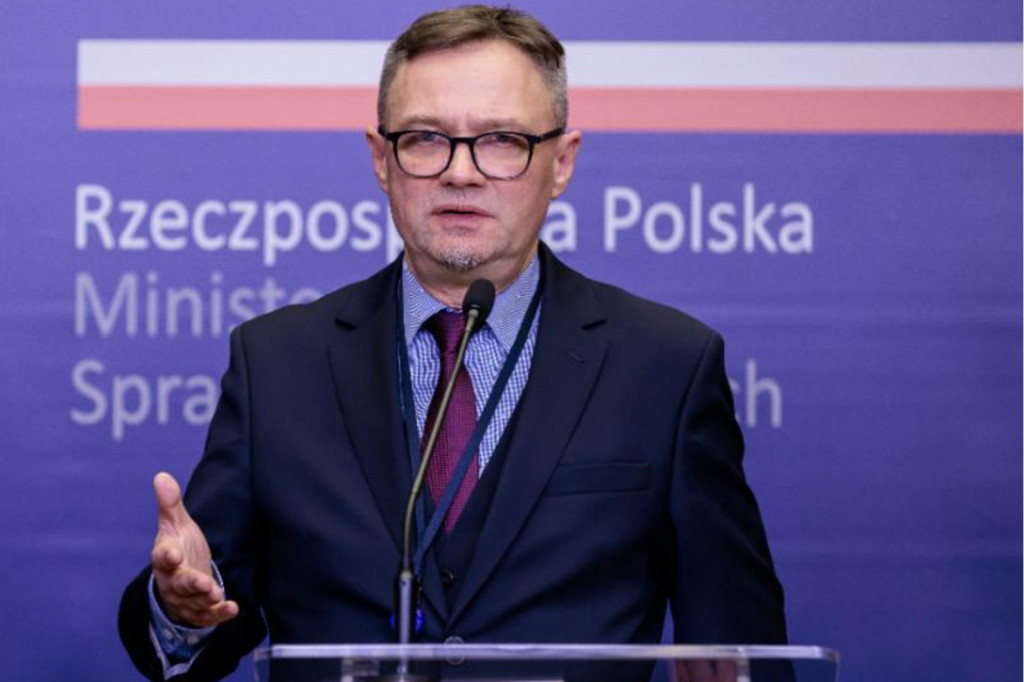05/01/2024, 14:29

Pavel Vronsky has been the spokesman of the Ministry of Foreign Affairs for several weeks (Photo: Sebastian Indra/MFA)
Pawel Wronski, the former deputy editor-in-chief of “Gazeta Wyborcza”, and since November the spokesperson of the Ministry of Foreign Affairs, instead of answering the questions, sent Onet instructions on how to answer them. The website immediately announced this.
Questions regarding the “Visa Scandal” were sent to Pavel Vronsky by Witold Jurasz, today Onet journalist and former diplomat. He asked, among other things: “Does the Ministry of Foreign Affairs share the assessment of Onet's editorial team that the main cause of the visa scandal was a leak in the visa system that made it possible to hack it, which happened both during the rule of the PO-PSL coalition and the rule of PiS during?” The journalist also asked about the dismissal of one of the directors in the Ministry of Foreign Affairs during the government of Pi.
heavy nut
Vronsky prepared guidelines for the press office staff on how to prepare a “draft answer”, but he mistakenly sent them to the questioner, Yurash. The journalist published everything in text on Onet.pl, writing that the guidelines showed that he could only hope for a “selective” response.
Also read: Malgorzata Walczak and Karolina Opolska talk to TVP Info. New faces
Jurashi points out that Vronsky's e-mail shows that if an official is fired, the press office must rely on the GDPR or perhaps wait for the journalist to submit a “power of attorney.” In the case of a leaky visa system, the response was to be cautious to avoid “political threats”.
Jerzy Hasczynski, the head of the foreign department of “Rzechpospolita” for almost a quarter of a century, admits that he does not remember a similar misconduct of the spokesperson of the Ministry of Foreign Affairs. – But these contacts were very limited for many years. And if someone avoids providing information, they're not making mistakes, Haschinsky says.
In the context of the instructions that Vronsky addressed to the employees of the Ministry of Foreign Affairs, he notes that in every environment – including the editorial office – there are messages that should not see the light of day.
– I must admit that Pavel Vronsky is having a difficult time now. Much depends on his reaction. And this should happen in a few minutes, of course, it cannot wait until the next day – says Haschinsky.
One sin of the new spokesperson of the Ministry of Foreign Affairs
Rafal Chekhovsky, head of Imago PR and crisis communication specialist. believes that the content of the guidelines written by Vronsky is correct.
– In my opinion, the content of these recommendations does not burden the spokesperson of the Ministry of Foreign Affairs in any way, neither from a professional point of view, nor from the point of view of the professional ethics of the speaker or the official. Comments by Chekhov. He notes that similar recommendations exist in other ministries and large corporations when creating answers to questions.
At the same time, he points out that Yurash made public the content of the correspondence, which, in fact, was not addressed to him. – If I were Pavel Vronsky, I would write to the Oneti journalist that I am surprised that he did not contact me after he received a correspondence that was obviously for someone else. I apologize for that, but at the same time I note the strength of the recommendations themselves in terms of content. I would make the letter public, advises a PR expert.
According to Rafal Chekovski, the only sin of the new press secretary of the Ministry of Foreign Affairs in this matter is negligence in using the mail. – And this should not happen, especially in diplomacy – concludes the PR head of Imago.
“Transferring work to other people”
Maria Busman, a specialist in image creation and communication in difficult and crisis situations, notes that it is important to be guided by the goals of the speaker answering journalists' questions. – He should try to answer the questions as completely as possible. However, it should be recalled that the speaker is not an impartial communicator, but an ambassador of the place where he works, he says.
Also read: Journalists organized a collection for Christina Kurchab-Redlich, whose savings were stolen.
– I served as a speaker many times, and I must mention that when I received such questions from Onet, I collected information as much as possible in order to prepare an answer together with myself or my colleagues. And if I had doubts, I would consult with individual people in the ministry. Especially since we are dealing with a crisis situation. Here we have an important “transfer” of the speaker's work to other people, for whom such references can be annoying, incomprehensible, but also cause negative opinions.
Is it necessary to save the image of the Ministry of Foreign Affairs after this failure? Maria Busman believes that the situation should be well explained. – The Ministry of Foreign Affairs should draw conclusions for the future and implement appropriate actions and internal instructions so that a similar situation does not happen again. And I mean both the content and most of the instructions, as well as the work model when providing information – says the specialist.
Also read: In the new “press”: Chuchnovsky about borders, Kamel a little soft, nuclear Polsat and funny Romek.
(PAR, 05/01/2024)
* If you find an error, select it and press Ctrl + Enter
(translate tags) press



